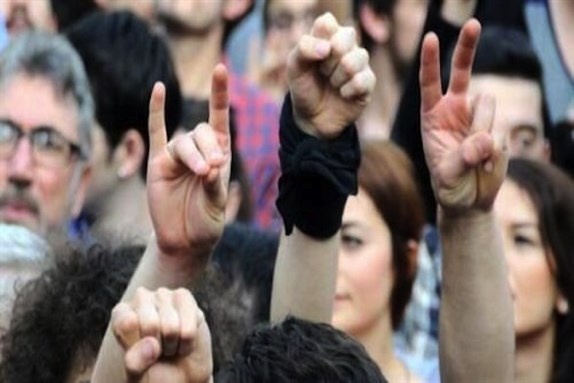The American Anthropological Association’s (AAA) annual business meeting voted on 20 November 2015 to send to the membership for a full vote a resolution to endorse the Palestinian call for the boycott of Israeli academic institutions. With more than ten thousand members, the AAA is the world’s largest professional organization of anthropologists. By an eighty-eight percent majority, a packed room voted 1,040 in favor and 136 against. A prior vote on a competing resolution opposing the boycott, misleadingly entitled a resolution to “support dialogue,” failed with 1,173 votes against and 196 votes in favor. The numbers say a lot: members of AAA, both faculty and graduate students, worked for three years on this resolution and succeeded in generating great interest and enthusiasm. The conference center ballroom was overflowing with attendees. A feed had to be set up in the lobby outside the meeting room to accommodate those who could not fit in the room.
Supporters of the boycott dominated the discussion of each resolution both numerically and rhetorically. The majority of speakers roundly rejected a first resolution that sought to condemn the academic boycott while proposing that the AAA ask the Israeli government to honor its obligations under international law—an endeavor that the US government itself has not been notably successful in furthering. That resolution was largely regarded as a rather clumsy effort to use the language of dialogue to disguise an anti-boycott resolution. The second resolution, for the institutional boycott, was delayed by the cumbersome process of counting paper ballots, required because of members` anxiety about recrimination and retaliation. So a number of participants had to leave before the vote was held. Nonetheless, as the numbers show, the support for the boycott resolution was overwhelming, and speakers for it greatly outnumbered those who opposed it.
For anyone who had attended the American Studies Association’s (ASA) discussion of the boycott or even the Modern Language Association’s (MLA) delegate assembly “town hall” on academic freedom last January, the pattern was happily and inspiringly familiar: supporters of the motion were diverse in terms of ethnicity, generation, gender, and sexuality. It seems fair to say they were also buoyant and positive. More importantly, the arguments supporters made for the academic boycott were markedly various in their focus and pitch and could not be mistaken for rehearsed talking points. The same could not be said of the opponents, who tended largely to recycle the tired objections that have ceased to carry much weight and who were painfully aware that the mood of the room was against them. Had the question not been called quite quickly on each resolution, long before all those already lining up at the microphone had had a chance to speak, the crescendo of support for the boycott resolution would only have become more striking. Many of us have been saying this for a few years: it is quite clear that the tide really has turned. The full membership will vote on the resolution in the organization`s spring ballot in April. As with the ASA, the outcome of this preliminary meeting is an excellent prognosis.
A fuller analysis of the AAA members’ success in mobilizing support, getting out the vote, and presenting the arguments will come in time. Much credit must go to their elected leadership. They allowed the process to take its course and also arranged for an official task force to visit Palestine and investigate conditions for Palestinian scholars and students. AAA President Monica Heller ran the meeting with grace and good humor. But clearly those promoting the boycott in the Modern Language Association (MLA) and other academic associations have much to learn from the exceptionally detailed, imaginative, and dedicated organizing sustained by the working group in AAA. Many of the working group members are graduate students and junior faculty who had to remain anonymous given their vulnerability to the increasingly common acts of retaliation that seek to intimidate supporters of Palestine.
Proponents of the boycott may also have something to learn, if only negatively, from the failed arguments of the opponents of the boycott resolution. The latter not only repeated some familiar arguments but also introduced some claims that speak volumes as to the contradictions of liberal Zionism. Many know the familiar arguments, repeated several times in the course of the panels preceding the business meeting and during the debate on the floor. Firstly, that the resolution is hypocritical in not commencing with the United States’ own violations of human rights and its record of ongoing military violence in the Middle East and beyond. Second, the tired accusation that the resolution cannot separate individuals from institutions. Those objections were rapidly rebutted.
As has many times been pointed out, the BDS movement’s efforts to mobilize global civil society have been necessitated by the United States’ blocking of all other political channels. This includes the so-called peace process and the United Nations, through which Palestinians could find redress for the manifold and amply documented injustices that Israel inflicts on them. BDS is a critique of and opposition to US foreign policy, militarism, and racism. It is also a critique of Israeli policy, militarism, and racism, as a client state utterly dependent on US economic, military, and diplomatic support, acts as a proxy and a laboratory for US and other repressive interests globally. These links, and their impact here in the United States, have become increasingly evident through the remarkable solidarity work between Palestine solidarity activists and groups like Black Lives Matter, organizations for the undocumented and immigrant rights groups, prison activists, and Native American organizations. All of these groups recognize the close connections between racist policing, controls on movement, dispossession, and ethnic cleansing that link US and Israeli settler-colonial projects in very material ways. Solidarity with Palestine does not only not preclude activism “at home,” in which most BDS supporters are in any case already involved. It is actually fully integrated in a network of solidarity that links activists in the United States to their counterparts elsewhere in the global resistance to neoliberal forms of repression and population control. There is no “either/or” in opposing Israel’s violations of Palestinian human rights and US interventions around the globe.
On the narrower issue of whether an institutional boycott violates Israeli academic freedoms, it became rapidly clear that opponents of the boycott resolution scarcely notice the real issue: Israel’s ongoing violations of Palestinian academic freedom. Their own (anti-boycott) resolution made no mention at all of those violations. Only after prompting from the floor did any of the anti-boycott speakers even acknowledge them, with palpable reluctance. Academic freedom is meaningless when it is distributed unequally. On the one hand, there are those who enjoy all its privileges in the context of the even greater privileges that settler-colonial status brings with it. On the other hand, there are those denied even the most basic freedoms, let alone unhampered study and research. But the complaint of the boycott’s opponents addressed only the possibility of the boycott having some effect on Israeli scholars. This always seems to mean scholars who are Jewish nationals of Israel rather than those second-class citizens who are the few Palestinian scholars in Israeli institutions.
What is remarkable and admirable, however, is not that the boycott will cause some discomfort and inconvenience to Israeli scholars, Palestinian or Jewish. Rather, it is the degree to which the framers of the boycott have bent over backward to protect their academic freedoms. Even the AAUP, a supposed proponent of academic freedom, repeatedly fails to understand what it entails. Academic freedom pertains to the individual scholar’s right to research, study, disseminate one’s research, and travel to conferences as well as other institutions or libraries in order to do so. It does not protect institutions as such, nor does it extend to all the perks and privileges that may accrue to scholars from their institutional affiliations. Every one of these rights is denied on a regular basis to Palestinian scholars and students. Not one of those rights is violated by PACBI’s carefully deliberated guidelines for implementing the boycott. Any Israeli scholar, to say it once again, is not only entitled but welcomed to speak at AAA, the American Studies Association, the Native American and Indigenous Studies Association, the Association for Asian American Studies, or any of the other organizations that have endorsed the boycott, and to publish in their journals. They may even do so using funds from their universities if those funds are part of the regular compensation that institutions offer to enable research. Only if the scholar attends as an official representative of an institution or at the behest of the Israeli state in order to do the work of hasbara, and only in that capacity, are they subject to boycott. The distinction is easy enough to make: any scholar knows when they are dealing with their dean or provost as an administrator and when they are talking to them as a colleague in political science or anthropology. The boycott means that we will not engage institutionally with Israeli universities. It does not—as the large presence of Israeli scholars this year at AAA testified—mean that Israeli scholars are not welcome in their individual capacity as scholars.
This is not to say, of course, that the implementation of the boycott will not produce inconvenience and discomfort; it can and it should. A boycott without any impact would hardly be worth fighting for. But, as Columbia University Professor Nadia Abu El Haj so succinctly put it at AAA, being affected is not the same thing as being targeted. Nonetheless, affect was everywhere in evidence at AAA. As the arguments against BDS and the academic institutional boycott become ever-more ineffectual, the affective rather than the rhetorical opposition grows ever louder. One Zionist response to losing the argument about Palestine and BDS has been coercion. Legal and administrative attempts to stamp out advocacy of BDS on campuses nationwide have multiplied exponentially over the last year or so. The counterpart of that open and direct coercion seems to be passive aggression. Over and again, opponents of the boycott complained plangently of their sense of exclusion, ostracism, and of no longer belonging. Perhaps the most preposterous claim was that the real aim of “leaders” of the BDS movement was to marginalize Israeli moderate or progressive voices, and that they were more focused on academic boycott than economic divestment or sanctions for that reason.
Leave aside the problematic assumption that BDS is a movement in which leaders dictate strategy to followers rather than a decentralized, rhizomatic, and global civil society movement. Put aside the fact that the majority of communiqués on BDS have been about the growing number of victories on divestment and against financial and commercial targets like Veolia. The fact is that BDS activists are not very concerned with the fate of liberal Zionists, a description that includes any “progressive” who continues to argue for preserving the special rights of one segment of the Israeli population at the expense of the other, no matter whether he or she identifies as “Zionist.” This is not to detract from the difficult work many Israeli progressives have done over the years to challenge the occupation or the more egregious violations of Palestinian rights. It is simply to recognize the politically disabling effects of seeking to be liberal while still maintaining racially based privilege. These effects consign settler progressivism to irrelevance. Liberal Zionism is an impossible category to sustain. You cannot consistently support the constitutive racial discrimination of the so-called “Jewish state” and still claim to uphold democracy, social justice, and progressive values. Nor can you dictate the modes and limits of their campaigns to those struggling against the oppression from which objectively you benefit, individually and institutionally.
Liberal Zionism cannot resolve such contradictions. Those who continue to try suffer from inevitable discomfort. But they have no real contribution to make to the ongoing struggle for justice in Palestine. Their “unenviable dilemma” is that of “the colonizer who refuses,” whom Albert Memmi so astutely portrayed in The Colonizer and the Colonized: “he may openly protest, or sign a petition, or join a group which is not automatically hostile towards the colonized. This already suffices for him to recognize that he has simply changed difficulties and discomfort. It is not easy to escape mentally from a concrete situation, to refuse its ideology while continuing to live with its actual relationships. From now on, he lives his life under the sign of a contradiction which looms at every step, depriving him of all coherence and all tranquility.” The discomfort of liberal Zionists, which manifested at the AAA in so much injured affect, is not the fault of the Palestinians, let alone of the BDS movement. It is an inevitable product of seeking to maintain the privileges that settler colonialism grants while hoping to persuade others that one is still progressive. That is the nature of colonialism and of a racial regime. As Adorno once put it, “Wrong life cannot be lived rightly.”
Anyone who has engaged in anti-racist work or with issues of gender or sexual equity within an educational institution is familiar with this dilemma. We know that to engage with the institutionalized forms of oppression—and every institution is the expression of dominant relations of power and privilege—always involves the difficult task of dis-identifying with the institution in which one works and, indeed, in which one often finds intellectual community, the means to work, and—sometimes—a degree of scholarly affirmation. It is not an easy negotiation. Yet it is one that we must daily undertake, here in the United States no less than anywhere else. To do so is to confront and not simply to lament the contradictions that are the inevitable accompaniment of living in a world structured by colonialism and racism.
We can complain, in the words of the anti-boycott resolution, that BDS is “conflating the activities of academics with the policies and actions of their governments.” Or, alternatively, we can recognize that that conflation is an objective effect of the ways in which our institutions are state apparatuses, bound up with the inequities that institutions of all kinds exist to perpetuate. Academic freedom, if it has any meaning at all, protects the right to challenge and unsettle the business-as-usual of those institutions and the powers they represent. Its exercise in practice rather than as a merely formal privilege demands dis-identification from institutions, not protecting them from their deep complicity in the material and ideological work of the state.
These facts are clear to scholars who work, in their research and in their daily practice, on analyzing and combating racism and colonialism. It is not surprising that associations like Asian American Studies, American Studies, and Native American and Indigenous Studies have led the endorsement of the boycott. The members of those associations have devoted their research to understanding the history and the present of colonialism and quickly recognize the familiar patterns of domination and dispossession that Israel imposes on the Palestinians. The American Anthropological Association, whose members have for decades engaged in critiquing and dis-identifying from the legacy of anthropology’s own disciplinary history of complicity with colonialism and racism, may now join those other associations in endorsing the boycott, a non-violent means to engage in the struggle for justice against institutionalized racism and state-directed dispossession. We should urge the full membership to vote yes on the resolution now before them.


















